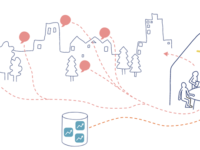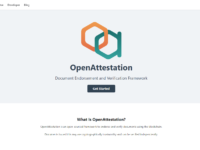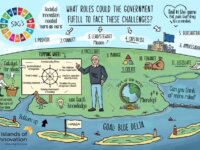The project proposes a system for extracting and analysing information from the medical records of breast cancer patients, using artificial intelligence. This would support research, personalised medicine and health decision-making, benefiting clinicians and regional authorities. This provides an automated alternative to accelerate translational research, promote personalised medicine and improve the efficiency of health services.
Innovation Tag: Cross-Border Innovation (Top 37)
Senior citizens are often excluded from cultural experiences located inside public museums, for reasons such as physical impairments, institutionalization, or health limitations. The BeauCoup innovation creates multisensory, inclusive technologies using digital and analogue tools to make cultural heritage accessible and engaging even outside the cultural institutions. Local, state, and federal governments that manage museums are involved in the innovation process of barrier-free cultural access.
Case Study
Itla View – Crowdsourcing and AI-based digital tool for knowledge management and systems…

Itla View is a digital tool to help local services for families with children to manage their activities better using up-to-date data, to anticipate the need for corrective services and identify opportunities for preventive work. It enables different actors to form a shared holistic picture of the well-being of children, young people and families in their area. Itla View collects observations sent by field actors on the daily lives of children and families. It utilizes artificial intelligence to…
The Sola calculation tool allows estimate the economic impact of 25 distinct social phenomena at municipal, regional and national level. Impact assessments at one, five and ten year intervals can lead decision-makers to better understand how to invest in wellbeing and accelerate impact investing. Results of the tool have been used in several municipalities as part of health and wellbeing promotion. A MOOC course has been developed and similar calculation tools are recently being used in other…
The City of Austin has piloted an anticipatory governance tool named the Civic Research Agenda (CRA) to help the City become future-ready in the face of complex civic challenges.
The CRA leverages a strategic foresight methodology to proactively plan for plausible future scenarios and identify implications for decision-making today, thus moving the City away from reactionary and short-sighted policy making and enable it to “look around the corner” to future challenges and opportunities.
The Knowledge Platform with the working title of 'ERA-volution' is a community space for dialogue on current EU initiatives between policy makers and stakeholders in Slovenia in the fields of Higher Education, Research and Innovation. In this way, we aim to strengthen the co-design and joint implementation of policies in these areas, to support cooperation of Slovenian stakeholders in EU initiatives, and effectively promote synergies between the fields.
Singapore's Government developed OpenAttestation, an open-source framework to support endorsement and verification of documents using the blockchain. With this, an easy and reliable way to issue and validate tamper-proof certificates is readily available to the Government as well as any adopters locally or internationally.
Better Insights into Collective Climate Actions: The currently fragmented, insufficient and incompatible sources building the climate data framework remain a critical threat to a successful outcome of the 2023 Global Stocktake for the Paris Agreement. While we observe an increasing amount of participation, effective ways of connecting, visualizing and analysing actors patterns & impact, within the overall climate initiatives, remain limited.
The Valenzuela City Social Welfare and Development Office (CSWDO) participated in the 13-week accelerator programme. The The accelerator is a 13-week innovation programme. The programme took the staff from CSWDO who needed to support individuals in crisis situations. They addressed the problems and applied innovation methodologies to create solutions that work. The programme targeted root-cause problems, facilitated collaboration, and upskilled participants – driving better outcomes.
Together with partners from 5 other European countries, the Province of Fryslân developed an innovation model (so-called Tipping Approach) to catalyse and stimulate bottom-up innovations and harness ideas from local stakeholders. Complementing this, a governance model is being developed to provide civil servants with tools to implement these innovations in the social process in a simple and user-friendly way.


